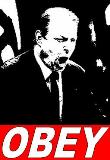As I had mentioned earlier in the MSM recycling the Bush wanted to oust Saddam story, the CNN story quoted a senior intelligence analyst who was questioning the link between Saddam and al Qaeda. To dispute his claim that the CNN article decided to print without any evidence supporting it, I thought I'd put forth some of the evidence of a connection to let the readers make up their own mind. I'll be paraphrasing from Richard Miniter's excellent book, Shadow War where he summed up the connections quite nicely.
- Abdul Rahman Yasin, 1993 world trade bomber and al Qaeda member, was paid a monthly salary and given a house by Saddam.
- Bin Laden himself met 8 or more times with Saddam's Special Security Organization (a secret police agency run by his son Qusay) and with Saddam's mukhabarat, his external intelligence service.
- Sudanese intelligence observed meetings between Iraqi intelligence and bin Laden starting in 1994.
- Bin Laden met the Iraqi mukhabarat director in 1996 in Khartoum.
- An al Qaeda operative currently held captive by the US confessed of a secret agreement between Iraqi intelligence and bin Laden to stop terrorist activities against Saddam.
- Senior mukhabarat officer, Farouk Hijazi, met with al Qaeda officers in Afghanistan in 1998 to reportedly offer bin Laden asylum in Iraq according to the Guardian.
- In October 2000, Iraqi intelligence operative Salah Suleiman was arrested near the Afghan border by Pakistani authorities. He was reportedly an information courier between Iraqi intelligence and Zawahiri, al Qaeda's #2 man.
- Up to 2001, the Iraqi embassy in Pakistan was used as a liaison between Saddam and al Qaeda.
- Yusuf Galan, charged by Spain as directly involved in 9/11, was invited to a party at the Iraqi embassy in Madrid
- In a Sunday Times report, an Iraqi defector reported that he saw al Qaeda in Salman Pak, the infamous terrorist training camp where terrorists learned how to hijack planes with knives on a real Boeing 707 in 1997. The defector was a colonel in Saddam's fedayeen.
- Uday Hussein's longtime aide Abbas al-Janabi confessed a direct connection between Iraq and al Qaeda in 1998.
- A former bodyguard of Zawahiri, found in a Kurdish prison, confessed to having been present at a meeting between Saddam and Zawahiri in 1992.
- After the fall of the Taliban, bin Laden associates "converged on Baghdad and established a base of operations there" where they supervised al Qaeda's global network.
- In 2001 an al Qaeda operative "bragged that the situation in Iraq was 'good.'"
- In 2001 two al Qaeda members were arrested entering Saudi Arabia from Iraq.
- Wounded in the war in Afghanistan by US forces, Zarqawi sought medical attention in Baghdad in May 2002. Upon recovery he started a training camp in northern Iraq. Zarqawi's cell funded and gave the orders for attacks including the assassination of Lawrence Foley of the US Agency for International Development in Amman, Jordan. Information from the captured assassin himself, who also said his accomplice sought refuge in Iraq after the attack.
- Zarqawi met al Qaeda military chief Saif al-Adel in Iran in February 2003, according to the WaPo.
- A captured senior al Qaeda member confessed that Mohammad Atef went to Iraq to search for locations for labs to manufacture chemical weapons.
- Abu Abdullah al-Iraqi was sent to Iraq by bin Laden to purchase poison gases several times between 1997 and 2000. He called his relationship with Saddam's regime successful.
- The New Yorker published the story of Mohamed Mansour Shahab, a smuggler hired by Iraq to transport weapons to bin Laden in Afghanistan.
- Documents recovered in Iraq, show Baghdad funded the Allied Democratic Forces, a Ugandan terror group led by an Islamic cleric with ties to bin Laden. Their purpose was to recruit youths for jihad for their international holy war network.
- Mullah Melan Krekar ran terrorist group Ansar al-Islam linked to both bin Laden and Saddam. Krekar admitted to having met multiple times with bin Laden and receiving funding from al Qaeda. Krekar operated in northern Iraq attacking Kurdish militants who were hostile to Saddam. The Kurds claim Ansar al-Islam was also funded by Saddam directly.
- After October 2001, intelligence shows that hundreds of al Qaeda fighters took refuge in Ansar al-Islam strongholds in northern Iraq.
Again, that information is from Richard Miniter's book Shadow War. In researching the book he traveled from Sudan across the Middle East to Malaysia speaking with contacts ranging from national intelligence officials to warlords and tribal leaders. If correct, I think it paints an undeniable picture of a history of cooperation between al Qaeda and Saddam's tyrannical regime, a connection our nation had ignored for too long. I find it entirely plausible that Bush had all the information he needed to go after Saddam after finishing the toppling of the Taliban in Afghanistan. The cooperation with al Qaeda (and other terrorist groups) and that Saddam had a history of pursuing and using weapons of mass destruction (regardless of the current state of his WMD program) was enough to necessitate his removal. Let's not also forget his human rights abuses, torture, and attempts at genocide on top of being in violation of 17 UN resolutions. After years of oppression, the Iraqi people deserved their shot at freedom and Bush was more than happy to help them along the way. |











